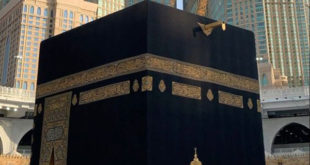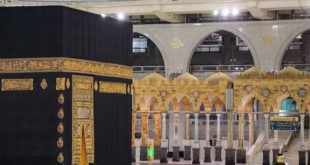Q: Is sadaqatul fitr waajib on a person who has debts? A: After deducting all his debts, if the remainder wealth he possesses equals the nisaab of zakaat or more, then sadaqatul fitr will be waajib on him. And Allah Ta’ala (الله تعالى) knows best. تجب على حر مسلم مكلف مالك لنصاب …
Read More »Recent Posts
May, 2013
-
21 May
Poor father discharging sadaqatul fitr of his wealthy children
Q: If the father is poor and his minor children possess wealth which equals nisaab, is it compulsory upon the father to discharge their sadaqatul fitr from their wealth? A: It is compulsory upon the father to discharge sadaqatul fitr of his minor children from their wealth. فيخرجها عن نفسه …
Read More » -
21 May
Father discharging sadaqatul fitr of his wealthy children from his wealth
Q: If a father discharges sadaqatul fitr on behalf of his minor children (who are wealthy) from his wealth, will the sadaqatul fitr be discharged? A: The sadaqatul fitr will be discharged. ( تجب ) … ( لا عن زوجته ) وولده الكبير العاقل ولو أدى عنهما بلا إذن أجزأ …
Read More » -
21 May
Father discharging minor children’s sadaqatul fitr from their wealth
Q: If the minor children possess the nisaab amount, can the father discharge their sadaqatul fitr from their wealth? A: The father can discharge the sadaqatul fitr from their wealth. فيخرجها عن نفسه وأولاده الصغار الفقراء وإن كانوا أغنياء يخرجها من مالهم (مراقي الفلاح مع حاشية الطحطاوى ص723, الدر المختار مع …
Read More » -
21 May
Sadaqatul fitr on behalf of one’s minor children
Q: Is it necessary for a wealthy person to discharge the sadaqatul fitr on behalf of his minor children? A: Yes, it is necessary for a wealthy person to discharge the sadaqatul fitr on behalf of his minor children. فيخرجها عن نفسه وأولاده الصغار الفقراء (مراقي الفلاح مع حاشية الطحطاوى …
Read More »
-
Tafseer of Surah Naazi’aat
وَ النّٰزِعٰتِ غَرۡقًا ۙ﴿۱﴾ وَّ النّٰشِطٰتِ نَشۡطًا ۙ﴿۲﴾ وَّ السّٰبِحٰتِ سَبۡحًا ۙ﴿۳﴾ فَالسّٰبِقٰتِ سَبۡقًا ۙ﴿۴﴾ …
Read More » -
The Extreme Generosity of Hazrat Talhah (radhiyallahu ‘anhu)
-
Securing the Blessings of Ramadhaan, Umrah and Hajj – The Tolerance of Rasulullah (sallallahu ‘alaihi wasallam) – The Orchards of Love – Part Seventy Three
-
Receiving the title of Al-Fayyadh from Rasulullah (sallallahu ‘alaihi wasallam)
-
Hazrat Talhah (radhiyallahu ‘anhu) Fulfilling his Pledge
-
Receiving Seventy Rewards
Hazrat Abdullah bin Amr bin Aas (radhiyallahu ‘anhuma) reported, “Whoever sends salutations upon Nabi (sallallahu ‘alaihi wasallam) once, Allah Ta‘ala and His angels will send seventy mercies and blessings upon him in return of his one Durood. Hence, whoever wishes to increase his Durood should increase it, and whoever wishes to decrease his Durood should decrease it (i.e. if he wants to earn great rewards, then he should increase his Durood).”
Read More » -
Increase in Sustenance
-
The Reward of Fasting on the Day of Arafah
-
The Angel that Stands at the Blessed Grave of Hazrat Rasulullah (sallallahu ‘alaihi wasallam) to Convey the Durood of the Ummah
-
Reciting Durood when Entering the Musjid
-
Sunnats and Aadaab of the Host – 2
2. Entertaining and hosting guests is a means of attaining great barakah (blessings) from Allah …
Read More » -
Sunnats and Aadaab of the Host – 1
-
Sunnats and Aadaab which every person needs to adhere to in his individual life – 9
-
Sunnats and Aadaab which every person needs to adhere to in his individual life – 8
-
Sunnats and Aadaab which every person needs to adhere to in his individual life – 7
-
Hazrat Ali (radhiyallahu ‘anhu) – Part Forty-One – Being Sent by Rasulullah (sallallahu ‘alaihi wasallam) to Level the Graves, Destroy Idols and Erase Pictures
Hazrat Ali (radhiyallahu ‘anhu) reports that on one occasion, Rasulullah (sallallahu ‘alaihi wasallam) attended a …
Read More » -
Rasulullah (sallallahu ‘alaihi wasallam) Approving of the Verdict of Hazrat Ali (radhiyallahu ‘anhu) – Part Forty
-
The True Ulamaa – Hazrat Ali (radhiyallahu ‘anhu) – Part Thirty Nine
-
Du‘aa for Assistance in Settling Debts – Hazrat Ali (radhiyallahu ‘anhu) – Part Thirty Eight
-
The Concern of Hazrat Ali (radhiyallahu ‘anhu) regarding Business being Conducted According to the Islamic Principles – Part Thirty Seven
 Ihyaaud Deen An Effort to Revive Deen in Totality
Ihyaaud Deen An Effort to Revive Deen in Totality


















































































